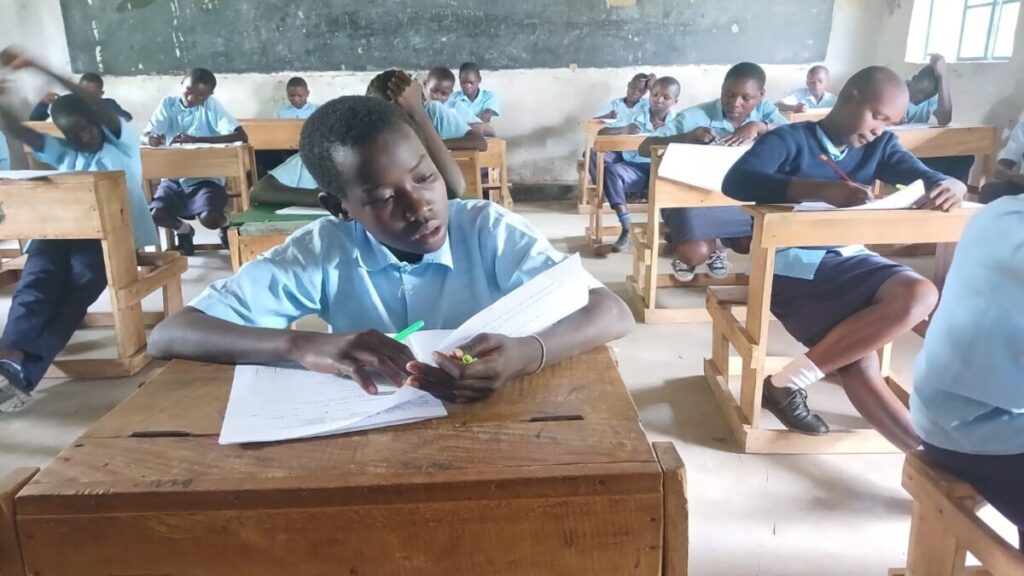Ten teachers from Pala Masogo Secondary School in Homa Bay County are now facing heavy charges after they allegedly photocopied a KCSE exam paper. In a swift response from the court, each educator was given a bond of Ksh 2 million, with a surety of the same amount, underscoring Kenya’s intensified crackdown on exam malpractice. This incident has brought renewed attention to the country’s efforts to protect the integrity of the Kenya Certificate of Secondary Education (KCSE) exams, a crucial milestone in students’ academic careers.

Students sitting for an exam. Courtesy photo
The incident unfolded when education officials, performing a routine check, reportedly discovered the teachers photocopying a KCSE Chemistry exam paper meant for a student who was hospitalized. Police arrested eight of the teachers on the spot, while the remaining two were brought in later for questioning. Sources indicate that the group was allegedly attempting to assist the hospitalized student, but their actions breached strict exam regulations, resulting in serious charges against them. Investigators are now probing further, seeking to determine if others were involved in the operation and evaluating how to reinforce security at other schools to prevent similar incidents.
The Kenya National Examinations Council (KNEC), together with law enforcement, has put multiple safeguards in place this year to prevent cheating and other exam malpractices. Armed officers are stationed at exam centres, and supervisors and invigilators undergo rigorous checks. However, despite these measures, cases of cheating persist. Last week, two students in Ruiru, Kiambu County, were caught attempting to bring mobile phones into their exam centre. These incidents highlight the difficulties authorities face in upholding fair standards in Kenya’s high-stakes education system.
Commenting on the arrests, a senior police official stated that those implicated in examination cheating would face “severe legal consequences,” regardless of their position or reasons. “The integrity of our national exams is not negotiable,” he emphasized, warning that any individual involved in such practices would be prosecuted to the full extent of the law.
The court proceedings in Homa Bay reflect the gravity of these offences. The bond requirement set at Ksh 2 million each, with a matching surety, has sparked public debate, with opinions divided. Some members of the education community believe the teachers may have acted out of genuine concern for the student, while others insist that such conduct amounts to a clear violation of Kenya’s examination rules. Public opinion is mixed, with some parents expressing concern about the impact this event could have on the reputation of KCSE results, which are instrumental in shaping students’ academic futures.
The KNEC has reiterated its commitment to ensuring that KCSE exams provide a fair and equal platform for all students. This commitment is particularly critical given the pivotal role the KCSE plays in determining university admissions and other future opportunities for students across Kenya. In response to the challenges presented by these recent cases, the Ministry of Education has strengthened the training of invigilators and emphasized strict adherence to exam protocols.
The scandal has ignited widespread public discussion about the role of teachers as trusted custodians of education. Some argue that greater accountability measures are needed for educators, especially given that teachers are expected to model honesty and integrity for students. The Teachers Service Commission (TSC) has expressed disappointment over the incident and has promised to review the conduct of any teacher found guilty of engaging in such malpractice.
Education experts are now calling for a more comprehensive approach to reform Kenya’s examination system. They argue that punitive measures alone will not address the underlying pressures that drive some teachers and students to cheat. Dr. Isaac Mwangi, a lecturer at the University of Nairobi, suggested that the government consider reforms that go beyond punishment. “If we don’t address the root causes, cases like this will keep happening,” he noted. Mwangi and others are advocating for systemic changes, such as reducing the high stakes associated with exams and encouraging skills-based learning over rote memorization.
As the KCSE exams continue across the nation, authorities remain on high alert for any signs of malpractice. This recent case serves as a strong message from the government and KNEC that any violation of exam policies will be met with strict consequences. While the ten accused teachers await further court hearings, Kenya’s judiciary, education authorities, and public continue to debate the balance between strict enforcement and broader educational reforms needed to safeguard the nation’s academic integrity.
With the entire country closely observing, the Homa Bay incident highlights the ongoing struggle to maintain transparency in Kenya’s education system. This case serves as a critical reminder of the stakes involved in the KCSE exams and the government’s determination to uphold fair standards. For the accused teachers, the immediate future is uncertain, with stringent bond requirements standing in the way of their release. Meanwhile, students across Kenya sit for their exams under increased scrutiny, a testament to the high expectations for a transparent examination process that respects every candidate’s right to an honest opportunity for success.